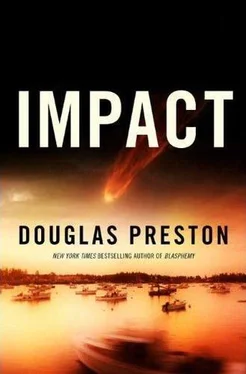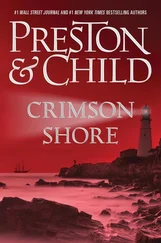Dolores Munoz loved that dog.
With a faint smile of anticipation she inserted the key in the lock, giving it a little rattle and waiting for the eruption of excitement.
Nothing.
She paused, listening, and then turned the key, expecting joyful barking at any moment. Still it did not come. Puzzled, she stepped into a small entryway. The first thing she noticed was that the side-table drawer was open, envelopes scattered on the floor.
"Professor?" she called out, her voice hollow, and then, "Stamp?"
No answer. Lately the professor had been a later and later riser. He was one of those types who drank a lot of wine with dinner and snifters of brandy afterward and it had been getting worse, especially after he stopped going to work. And then there were the women. Dolores was no prude and she wouldn't have minded if it was the same girl. But it never was, and sometimes they were ten, twenty years younger than he was. Still, the professor was a fine, fit man in the prime of life who spoke excellent Spanish to her using the Usted form, which she appreciated.
"Stamp?"
Maybe they had gone out for a walk. She moved into the front hall and peered toward the living room, suddenly drawing in her breath. Papers and books were scattered over the floor, a lamp was overturned, and the far set of bookshelves had been swept free, the books lying in jumbled heaps below.
"Professor!"
The full horror of it sank in. The professor's car was in the driveway and he must be at home--why didn't he answer? And where was Stamp? Almost without thinking, her plump hand fumbled the cell phone out of her green housedress to dial 911. She stared at the keypad, unable to press in the numbers. Was this really the kind of thing she should get involved in? They would come and take down her name and address and check her out and the next thing she knew, she would be deported to El Salvador. Even if she called anonymously from her cell, they would still track her down as a witness to . . . she refused to complete the thought.
A feeling of terror and uncertainty seized her. The professor could be upstairs, robbed, beaten, injured, maybe dying. And Stamp, what did they do to Stamp?
Panic took hold. She stared about wildly, breathing heavily, her large bosom heaving. She felt tears spring into her eyes. She had to do something, she had to call the police, she couldn't just walk out--what was she thinking? He might be hurt, dying. She had to at least look around, see if he needed help, try to figure out what to do.
Moving toward the living room, she saw something on the floor, like a crumpled pillow. Unbearable dread in her heart, she took a step forward, then another, placing her feet with infinite care on the soft carpet, and gave a low moan. It was Stamp, lying on the Persian rug with his back to her. He could have been sleeping, with his little pink tongue lolling out, except that his eyes were wide open and clouded over and there was a dark stain on the rug underneath him.
" Ohhh ooohh ," she said, the involuntary sound coming out of her open mouth. Beyond the little dog lay the professor, on his knees, kneeling almost as if praying, almost as if he were still alive, oddly balanced so it looked like he should topple over, except that his head was hanging to one side, halfway off, like a broken doll's head, and a coil of wire wrapped around two dowels of wood dangled from the half-severed neck. Blood had sprayed like a hose over the walls and ceiling.
Dolores Munoz screamed, and screamed again, knowing vaguely that deportation lay in those screams but somehow unable to stop and no longer caring.
4
Wyman Ford entered the elegant confines of the Seventeenth Street office of Stanton Lockwood III, science advisor to the president of the United States. He remembered the room from his previous assignment: the power wall, the pictures of the wife and towheaded children, the Important Washington Power Broker antique furnishings.
Lockwood came around the desk, silver haired, his blue eyes crinkling, footfalls hushed on the Sultanabad carpet. He grasped Ford's hand in a politician's shake. "Nice to see you again, Wyman." He reminded Ford of Peter Graves, the white-haired man who played the leader of the Mission Impossible force on the old television series.
"Good to see you, too, Stan," Ford said.
"We'll be more comfortable over here," he said, gesturing toward a brace of leather wing chairs flanking a Louis XIV coffee table. As Ford settled in, Lockwood seated himself opposite, giving the knife-edge in his gabardine slacks a little tug. "What's it been, a year?"
"More or less."
"Coffee? Pellegrino?"
"Coffee, thanks."
Lockwood signaled his secretary and leaned back in the chair. The old trilobite worry stone appeared in his hand and Ford watched him roll it about pensively between thumb and forefinger. He bestowed a professional Washington smile on Ford. "Any interesting cases lately?"
"A few."
"Time for a new one?"
"If it's anything like the last one, no thanks."
"Trust me, you'll like this assignment." He nodded to a small metal box on the table. "They call them 'honeys.' You heard of them?"
Ford leaned over and peered through a thick glass window in the top of the box. Inside winked a number of deep orange gemstones. "Can't say I have."
"They appeared on the Bangkok wholesale market about two weeks ago. Going for big money--a thousand dollars for the cut carat."
A serving man came in wheeling a fussy little sideboard with silver coffeepot, lump raw sugar, cream and milk in separate silver pitchers, and china cups. The little tray rattled and squeaked as it was pushed along. He parked it next to Ford.
"Sir?"
"Black, no sugar, please."
The man poured. Ford sat back with the steaming cup and took a sip.
"I'll leave the pot here in case the gentleman wants another."
The gentleman would want another , thought Ford, draining the tiny china cup with one gulp and refilling it.
Lockwood worried the stone in his hands. "I've got a team of geophysicists at Lamont-Doherty in New York working on what they are. The stones are unusual in composition, with an index of refraction higher than a diamond, specific gravity thirteen point-two, hardness nine. The deep honey color is almost unique. A beautiful stone--with a twist. They're laced with Americium-241."
"Which is radioactive."
"Yes, with a half-life of four hundred thirty-three years. Not enough radiation to kill you right away but enough to create long-term exposure problems. Wear a string of these around your neck and you're liable to lose your hair after a few weeks. Carry a pocketful of these around for a couple of months and you might sire the monster from the black lagoon."
"Lovely."
"The stones are hard but brittle and easily pulverized. You could take a few pounds of these gems, grind them up, pack them in C-4 in a suicide belt, detonate it in Battery Park when the wind is from the south, and you could loft a nice radioactive cloud over the financial district, wipe out a few trillion dollars of U.S. market capitalization in half an hour and render lower Manhattan uninhabitable for a couple of centuries."
"Nice work if you can get it."
"Homeland Security is freaking out."
"Do the Bangkok dealers know they're hot?"
"The reputable wholesalers won't touch 'em. They're being funneled through the dregs of the gem market."
"Any idea how these gems formed?"
"We're working on it. Americium-241 is not an element that exists naturally on Earth. The only known way it can be made is as a by-product of a nuclear reactor producing weapons-grade plutonium. These 'honeys' might well be evidence of illicit nuclear activity."
Ford finished his second cup and poured himself a third.
Читать дальше












